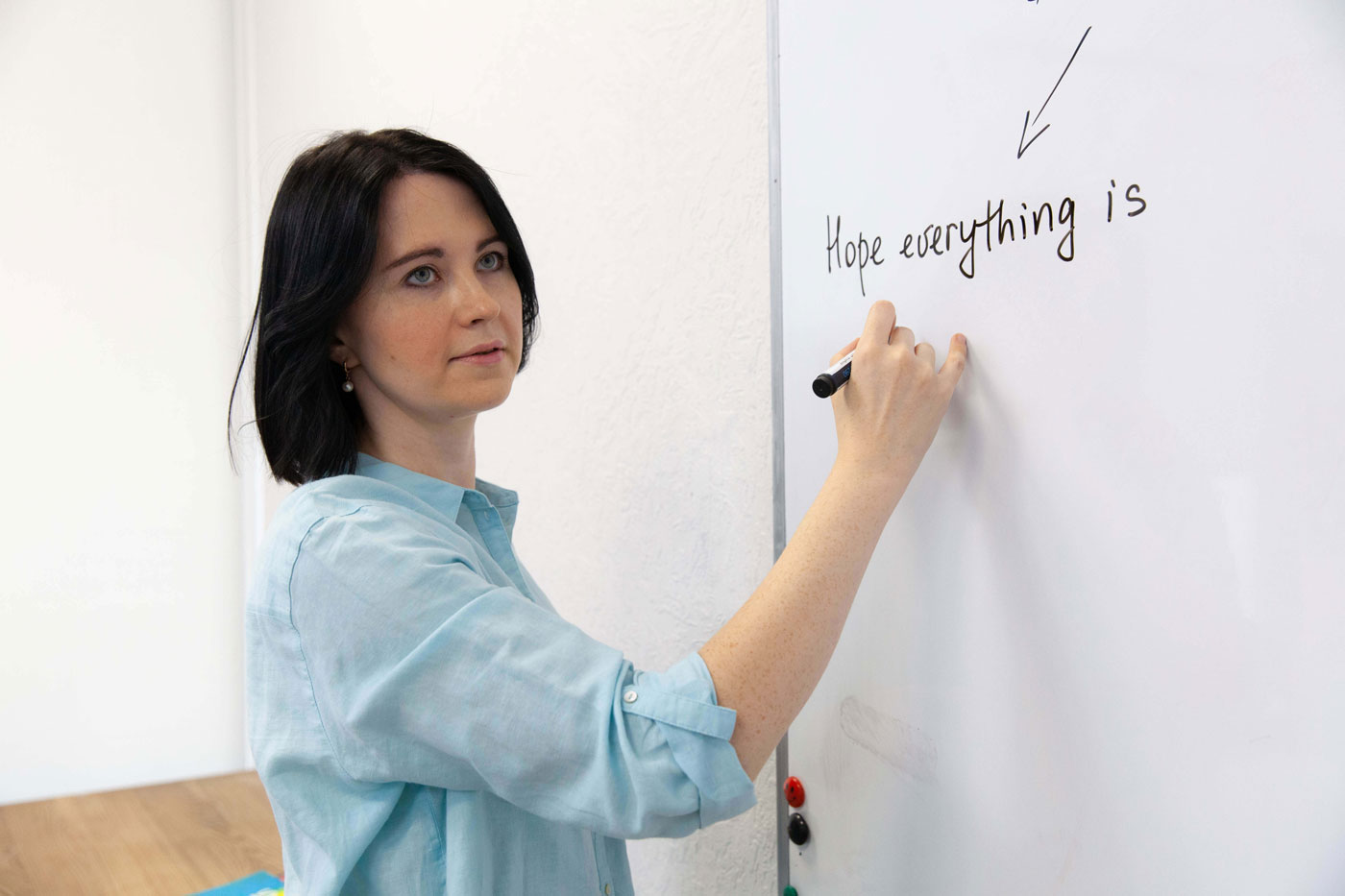| |  | | | | | Вітаємо! На зв’язку команда Grade. Отже ми розпочинаємо сезон наших подій для вчителів англійської мови. Найближчим часом у нас заплановано:   
Для викладачів IELTS: | | | | | | 
Воркшоп IELTS essays з Андрієм Пігарєвим  Essay writing is considered one of the most challenging parts of the IELTS by students and candidates, many of whom have hard times understanding what exactly they should be writing about, lack ideas or creativity to develop the topic or lack essay writing skills unless well prepared. Having around 40 minutes for this task requires a clear idea of how to approach this task as well as a huge amount of practice. These are the reasons why knowing how to teach IELTS essays is important both for learners and their teachers. The workshop will focus on various kinds of essays that can be encountered in the exam and what steps should be taken in order to understand the task, plan, write and check the response. In addition to this, challenges of dealing with this task will be explored and practical activities to raise awareness and practice writing sub-skills will be offered. Understanding how student writing is evaluated and practicing assessing essays is another area that will be covered in the workshop. Коли: 16.02.2020 Де: Grade Education Centre, Київ Вартість: 800 грн. | | | | | |  | | | | | | 
Вебінар IELTS visuals з Андрієм Пігарєвим  Both students and teachers face a number of difficulties when dealing with IELTS visuals. Some of them are related to a variety of task types in the exam with their own distinctive features, as well as time constraints and the type of language to use to get a decent score. It takes quite a while to master all this and then practice, practice and practice. In the webinar, we will be looking at the peculiarities of different kinds of IELTS visuals, from line graphs to processes and how to deal with them while preparing for and taking the exam. How to ‘read’ a visual and identify its key features? How to approach tasks in order to successfully describe visuals? What problems do students and teachers face with visuals and how to solve them? What do examiners look for when assessing writing tasks? What activities can help the learning process and improve the score? These questions will be raised and explored during the webinar. Коли: 2.02.2020 Де: Online Вартість: 149 грн. | | | | | |  | | |   
Для всіх викладачів: | | | 
Воркшоп Анни Шовкалюк The Psychology of learning та Олени Бочкарьової Critical thinking skills in the ELT classroom  Anna Shovkaliuk. The Psychology of learning Have you ever wondered what’s happening in your students’ brains when you teach them new language? How do things work when they try to automatize the language in their head? The faces and the comments your students make when they try to grasp the meaning of what’s being taught might sometimes lead us to thinking that a complex cognitive process is happening inside of their heads. At the workshop, we’re going to look into the learner’s brain and the cognitive processes that underlie the learning that’s happening. After all, it’s the brain, new connections, working memory and hundreds (if not thousands!) of processes that happen in our minds when we learn something new including the new language. The psychology of learning is a broad topic that is still being researched and we’re going to look at the recent findings that will help language teachers understand their learners better and adapt to their students’ needs and abilities. We’re going to combine the theoretical understanding of how learning works with the practical applications of teaching English in a variety of contexts. Olena Bochkarova. Critical thinking skills in the ELT classroom We often see the primary aim of teaching in the development of our students’ language skills. Even if a certain activity implies the development of some other skills, we tend to ignore that. However, our globalized fast-growing world requires a different approach where a student needs to be better informed and needs higher-order and flexible skills. So what else can we offer our students to find a way in the flow of information? Critical thinking development is one of the solutions that can lead to higher academic achievements and success in life. In this session, we will look at what critical thinking is, why it has become one of the 21st-century skills and what sub-skills it comprises. Then, we will analyse the activities with the help of which critical thinking sub-skills can be practically developed in the classroom. In addition, we will see how you can empower the already known activities with less common techniques and try them out. Finally, we will try and adapt some activities so that they enable students to develop critical thinking sub-skills as well. Коли: 26.01.2020 Де: Grade Education Centre, Київ Вартість: 399 грн. | | | | | |  | | | | | | 
Воркшоп Любові Дороніної DEC as a teacher’s magic wand та Альони Тригуб TBL – how to bring the real world into your lessons?  Liubov Doronina DEC as a teacher’s magic wand Being a good teacher means helping our learners to speak fluently and accurately. While conducting freer-practice activities, teachers often have doubts whether they need to focus on errors their students make and either skip this stage, or focus on just 2-3 things. In this session, we will take a look at DEC (delayed error correction) in more detail and see whether our learners really benefit from it. As conducting a balanced and engaging delayed-error correction can be challenging at times, you will be able to try your hand at doing that yourselves. In addition, we will focus on different types of monitoring for DEC and see what can be done to make it as effective as possible. Alona Trygub TBL — how to bring the real world into your lessons? How often do we ask our students to do something in class which they would do in everyday life using their own language? Probably not often. However, if we can make language in the classroom meaningful and therefore memorable, students get opportunities to experience and activate language more naturally. One of the ways to do this is to use a task-based learning (TBL) approach in class. The workshop presents different options of integrating TBL into a typical coursebook to maximise learning opportunities for your learners and to save teacher preparation time. We will compare two lesson frameworks and look at some practical and transferable activities in order to make learning more engaging and to guard against minimal participation by less motivated students. Коли: 16.02.2020 Де: Grade Education Centre, Київ Вартість: 399 грн | | | | | |  | | | | | | 
Вебінар Кріса Різа Differentiation: teaching your students, not your groups.  Throughout my teaching career, I’ve found that there is always a problem with teaching groups of students – that the group is, in fact, a collective of individuals with their own interests, abilities, strengths, and weaknesses. However, I’ve noticed both when working with teachers on teacher training courses (such as CELTA) and in my own practice, we have a tendency to view the groups that we teach as a monolith – a collective we think about in much the same way we think about businesses or organizations – when we say, “Oh, the students loved it!” or “That lesson was too easy for the students.” By doing this, we ignore that each of the individuals in the class is – privately – experiencing a different lesson with a different level of challenge and interest. In this webinar, participants will explore some of the key ways that we can take advantage of our learners’ differences in order to produce more engaging, challenging, or accessible lessons. Participants will also leave with low-preparation techniques that they can use to adapt their course books and the materials they are already using in their lessons to better meet the needs of all of their learners. Key takeaways: 1) Key principles of differentiation 2) Techniques for adapting materials and lessons for different purposes 3) Tips and tricks to make differentiation work more smoothly in your classrooms Коли: 23.01.2020 16.00-17.00 Де: Online Вартість: 99 грн | | | | | |  | | | | | | In order to continue to receive our emails in time, please add our address to your contact list or move this email to your inbox if you’re using gmail. We would also be grateful if you could review us or recommend us on Google Maps and Trustpilot. |
| | | | 044 300 23 40 | 068 289 38 02 | | Map | © 2008—2019 Grade Education Centre,
Cambridge Assessment English Autorised Platinum Exam Centre (license UA007),
Facebook, Instagram You’re receiving this email because you are studying or have studied, taken a test or an exam, attended a workshop or any other event organized by Grade Education Centre or our partner’s, including Cambridge Assessment English, and have agreed to receive emails from Grade education Centre Unsubscribe |
|
|
|